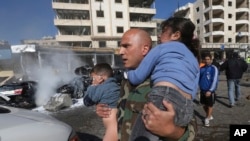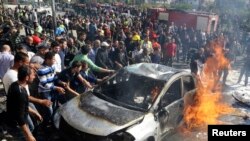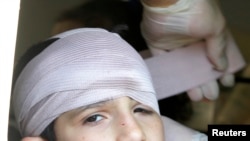CAIRO —
Two suicide attackers detonated cars stuffed with explosives Wednesday in Beirut's mostly Shi'ite southern suburbs, close to the Iranian Cultural Center and a nearby Islamic orphanage. Health Minister Wa'el Abou Faour told journalists at least four people were killed and more than 100 were wounded.
Fire and rescue workers doused the burning wreckage of a late-model BMW car. The driver blew himself up in front of the Iranian Cultural Center in Beirut's southern suburbs, a mostly Shi'ite Muslim area that is a stronghold of Hezbollah fighters. A second suicide bomber detonated his vehicle less than 100 meters away, in front of an Islamic orphanage, injuring several children, but killing no one but himself.
Lebanese media urged citizens to donate blood to help victims of the explosions.
A Sunni militant group calling itself the Abdullah Azzam Brigades claimed responsibility for the blasts, according to Lebanese satellite channels. Lebanese security forces arrested several members of the group 10 days ago as suicide bombers in training. The group's leader reportedly died in government custody after being arrested at a Beirut hospital.
Faour sees the bombings as a message to Lebanon's fractious political establishment, since the attack came just days after formation of a new government.
He says there is a double message from the bombings: that the formation of the government did not solve the conflict facing the country, and a second message that the new government must work even faster to find a political entente [accord].
Investigating magistrate Judge Saqr Saqr told Lebanese media that one of the suicide vehicles was packed with 90 kilograms of explosives, and the second carried 70 kg. Both vehicles had been stolen.
Interior Minister Nouhad Mashnouq said the new government will take all necessary steps to put a stop to terrorism both in Lebanon and in neighboring Syria.
He says there are unguarded border crossings with Syria that stolen vehicles intended to deliver explosives can cross easily. The minister said Lebanon must put a stop to these "death traps" on its side of the Bekaa Valley, and that all political forces must cooperate in that effort.
Iranian Ambassador Ghazanfar Ruknabadi told reporters at the Lebanese prime minister's office that he "deplored the loss of life of all victims of the bombings," especially a Lebanese security officer who prevented one of the bombers from getting close to the Iranian Cultural Center. He said no Iranians were killed or wounded in the blasts.
The Iranian Embassy compound was gutted in another suicide attack in Beirut's southern suburbs just three months ago.
Tensions between Lebanon's Sunni and Shi'ite Muslim communities have been extremely tense due to the sectarian civil war raging in neighboring Syria, and tit-for-tat bombings have rocked the country for months. Lebanon's pro-Iranian Shi'ite Hezbollah militia has been fighting inside Syria on the side of the government of President Bashar al-Assad.
One of Hezbollah's political leaders in parliament, Ali Ammar, said his group would "continue to fight in Syria on the side of the the government, no matter what the cost."
Hezbollah's overall leader, Sheikh Hassan Nasrallah, has insisted repeatedly that his fighters are "defending Shi'ite holy sites inside Syria." Hundreds of Hezbollah members recently have been fighting Syrian Sunni rebels in the mountainous border region with Lebanon known as Qalamoun.
An Iranian member of parliament said publicly last week that his country has trained "thousands" of Shi'ite fighters from Iraq, Lebanon and elsewhere to "fight on the side of the Assad government." Many Arab analysts accuse the chief of Iran's Revolutionary Guards, Qassem al Suleimani, of spearheading the Sunni-Shi'ite war that is raging in Syria, Iraq and Lebanon.
Fire and rescue workers doused the burning wreckage of a late-model BMW car. The driver blew himself up in front of the Iranian Cultural Center in Beirut's southern suburbs, a mostly Shi'ite Muslim area that is a stronghold of Hezbollah fighters. A second suicide bomber detonated his vehicle less than 100 meters away, in front of an Islamic orphanage, injuring several children, but killing no one but himself.
Lebanese media urged citizens to donate blood to help victims of the explosions.
A Sunni militant group calling itself the Abdullah Azzam Brigades claimed responsibility for the blasts, according to Lebanese satellite channels. Lebanese security forces arrested several members of the group 10 days ago as suicide bombers in training. The group's leader reportedly died in government custody after being arrested at a Beirut hospital.
Faour sees the bombings as a message to Lebanon's fractious political establishment, since the attack came just days after formation of a new government.
He says there is a double message from the bombings: that the formation of the government did not solve the conflict facing the country, and a second message that the new government must work even faster to find a political entente [accord].
Investigating magistrate Judge Saqr Saqr told Lebanese media that one of the suicide vehicles was packed with 90 kilograms of explosives, and the second carried 70 kg. Both vehicles had been stolen.
Interior Minister Nouhad Mashnouq said the new government will take all necessary steps to put a stop to terrorism both in Lebanon and in neighboring Syria.
He says there are unguarded border crossings with Syria that stolen vehicles intended to deliver explosives can cross easily. The minister said Lebanon must put a stop to these "death traps" on its side of the Bekaa Valley, and that all political forces must cooperate in that effort.
Iranian Ambassador Ghazanfar Ruknabadi told reporters at the Lebanese prime minister's office that he "deplored the loss of life of all victims of the bombings," especially a Lebanese security officer who prevented one of the bombers from getting close to the Iranian Cultural Center. He said no Iranians were killed or wounded in the blasts.
The Iranian Embassy compound was gutted in another suicide attack in Beirut's southern suburbs just three months ago.
Tensions between Lebanon's Sunni and Shi'ite Muslim communities have been extremely tense due to the sectarian civil war raging in neighboring Syria, and tit-for-tat bombings have rocked the country for months. Lebanon's pro-Iranian Shi'ite Hezbollah militia has been fighting inside Syria on the side of the government of President Bashar al-Assad.
One of Hezbollah's political leaders in parliament, Ali Ammar, said his group would "continue to fight in Syria on the side of the the government, no matter what the cost."
Hezbollah's overall leader, Sheikh Hassan Nasrallah, has insisted repeatedly that his fighters are "defending Shi'ite holy sites inside Syria." Hundreds of Hezbollah members recently have been fighting Syrian Sunni rebels in the mountainous border region with Lebanon known as Qalamoun.
An Iranian member of parliament said publicly last week that his country has trained "thousands" of Shi'ite fighters from Iraq, Lebanon and elsewhere to "fight on the side of the Assad government." Many Arab analysts accuse the chief of Iran's Revolutionary Guards, Qassem al Suleimani, of spearheading the Sunni-Shi'ite war that is raging in Syria, Iraq and Lebanon.











